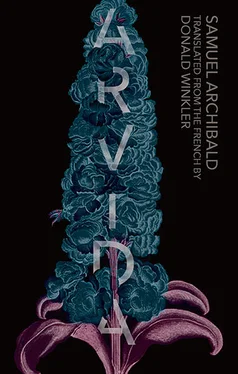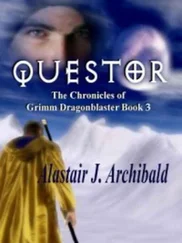I thought that was a good idea. So I quickly familiarized myself with the keys and the mechanics and the gummy letters that sometimes got stuck to the page. I began to recount any old thing on it, especially stories stolen from Will Eisner (whose Spirit we had in translation in my uncles’ old Pilote magazines which my grandmother had saved), and from Stephen King, the world’s coolest writer at the time. I wrote awful stories set in an Arvida that wasn’t entirely fictional, where the sheriff was called Jim, his wife Deborah, and their son Timothy.
(It’s also then that I became an insomniac for good. The child starts to write by resisting sleep. In his room, between the sheets, he wards off what will soon escape him forever, when his whole life he’ll be chasing after sleep and feeling it slip through his fingers. But that’s where it begins: a child in his bed, in flight from it. Not to sleep, not to dream, never to close his eyes. Darting them everywhere in the darkness, remembering the day, imprinting in his mind everything about it that was ugly and everything that was beautiful.)
Later, I wanted to write my own stuff.
In a little notebook, I jotted things down that I afterwards transcribed onto the machine. I looked into things that had really happened in Arvida, and I tried to put together a kind of working-class mythology. Strange happenings were few and far between, because the town was young and its occult underside pretty tenuous. I listened for stories told by older brothers and sisters that were not silly tales off a Ouija Board or yarns about a demented baby-sitter who roasted babies in an oven like turkey.
I didn’t find much.
My mother said that my godmother had once lived in a house in Saint-Mathias where there had been a suicide, and left after a few months, refusing ever to talk about it.
In a house on Rue Faraday, on the second floor, behind a high narrow window giving onto the church, you could see at sundown, in the summer, and when the night sky turned opaque in winter, a woman gazing out distractedly, humming a lullaby to her child. In the bed, the baby was dead. It was a ghost, of course, but the ghost of a dead baby. It wasn’t its own ghost, it was part of what was left behind by its dead mother. The baby cried no more, breathed no more, neither in this world nor the next. It was the ghost of something else, something deathly pale, black around the eyes and black at the lips, which the mother was trying to put to sleep. I didn’t know if the baby changed. Someone had told me that the baby in the bed was dead. I promised not to say who. Me, on the sidewalk, I just saw the mother bent over the cradle. I’m not even sure she was dead.
On Rue Oersted, a former tenant talked to me about something strange. There were no ghosts at that address. It was just that in a big empty house, you heard, two or three times a year, an echo of ancient conversations. The tenant, alone, intrigued, got up in the middle of the night to check out all the rooms, one by one, in the dark. He had to conclude that those voices came from nowhere.
In the woods stretching from the water purification factory road to the golf course, there lived a monster. When we took that road to get a Pepsi and chips paid for by friends of my father who drank at the clubhouse there, we often heard it, enormous, moving among the branches. We fled, screaming, until we were out of breath and the thick greenery opened out onto the golf course parking lot. I always thought it was a Tyrannosaurus. My brother said it was a werewolf. Stéphane Blais said it was a bear, Jean-Nicolas Frigon a flying shark, and my Bergeron cousins a dragon. Much later, after I’d forgotten the absolute terror and the imagined silhouette that rustled in the leaves, a friend told me that there really was a monster living on the golf course, she’d seen it, and it had told her things.
It was a man.
I tried to write a whole story, once, about our house at the end of Rue Gay-Lussac. It was a huge white wooden house with black shutters, an annex, a double garage, and an inground swimming pool, the dream house my parents had bought when they were rich.
My story was that of a man who as an adult bought back a house he’d lived in as a child. He moved into it with his wife and child, and realized that the house was haunted by himself. The man had been clinically dead at the age of twelve, drowned in the pool. I never managed to finish it, because I didn’t know if it was a sad story or a horror story. We’d had to vacate the house in 1987. At the end my parents each slept in their own room at either end of the hall, and the damaged swimming pool had become a real swamp. Frogs swam in its stagnant water, and every week we found dead animals there.
She’d had a good idea, sitting me down in front of the Underwood, my grandmother, mother of my father. Unfortunately for her, and above all for me, there are always times when I get attached to stories that aren’t stories really, that begin without ending and never get anywhere. Possibilities, dreams, and missed rendezvous. Phantoms and absences.
My favourite story happened to a friend of my brother, whom I’ll just call D.
D. lived alone with his brother and his mother. He talked about how, when he was seven years old, he’d been told his father had died from cancer. This was false, we knew, as D. himself learned later on.
His father had killed himself, jumping from the Shipshaw Bridge.
An engineering jewel financed by Arthur Vining Davis, completed in 1950, opened by Maurice Duplessis, and still today the only aluminum bridge in the world, the Shipshaw Bridge, built in an arc, rises over an arm of the Saguenay River almost forty metres above a dizzying gorge, a rough current, and sharp rocks. I forget how many people actually killed themselves there, but in my father’s unfettered imagination, they’re legion.
That’s also his way of telling me that his morale is low. Sometimes I call, I ask him how he is, and he replies:
“They’re serving number 6 on the Shipshaw Bridge. I’m 72.”
Many or not, D.’s father was one of them. After D.’s mother had left Arvida for a neighbouring town, she preferred the expurgated story of a cancer to that of suicide.
At the age of sixteen, D. began to go out with a young woman whose family had just resettled in the area, after the father, who worked for Hydro Quebec, had been for two decades posted in various parts of the province. Through his girlfriend, D. learned that his new father-in-law had once been a close friend of his own father.
There came the day when she introduced him to her parents. The usual conversation, silences, unease and forced laughter, until D. finished the beer he’d been offered, and began to feel more at ease. The father was left alone with him, and inquired about his mother, his brother, and himself. After a while, feeling more at ease himself, he asked:
“Do you have news from your father from time to time?”
D. replied, troubled:
“Sir, my father has been dead for ten years.”
The father-in-law choked on his beer, and apologized for his unpardonable lapse. They went to the table, but D. had clearly seen how the father had gone pale in pronouncing those words, and how he’d avoided his gaze afterwards. He didn’t do anything in front of his girlfriend, and waited for the next day to go and pursue the subject at the man’s workplace.
“Sir, yesterday you asked me if I’d had news of my father, and you nearly passed out when I told you he was dead. I’d like to know why. I’d like you to tell me the truth, and not try to make me believe that it was nothing, because I saw in your face that it isn’t nothing.
His father-in-law sighed.
“As you wish, my boy. I didn’t know your father was dead, because I was far from here at that time. I thought your parents were divorced. But I think you should make your own inquiries, because I ran into your father in the street in Rouyn last year.”
Читать дальше












